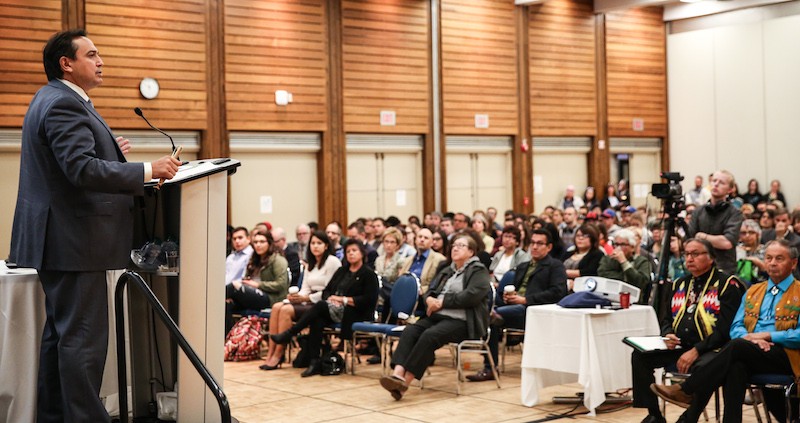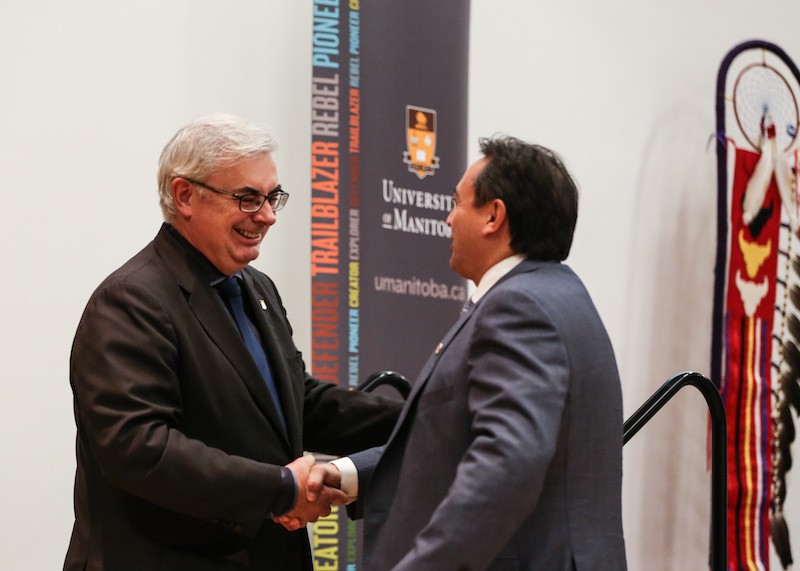
AFN National Chief Perry Bellegarde speaks to a full house at the U of M on Sept. 22
National Chief speaks to campus community
Assembly of First Nations (AFN) National Chief Perry Bellegarde spoke to the University of Manitoba community on September 22, calling on Canadians to “close the gap” between First Nations people and non-Indigenous Canadians.
The National Chief spoke about the vast difference in the quality of life experienced by different people in this country and what Canadians can do to address it.
“According to UN human development index, Canada is ranked sixth in quality of life, but if you apply these same ratings to Indigenous communities, we are 63rd,” said Chief Bellegarde.
The upcoming federal election is a chance to close the gap, according to the National Chief. “Wherever decisions are being made, we need to see Indigenous peoples. October 19 is a great opportunity,” explained Chief Bellegarde. He challenged each individual in attendance to challenge candidates to make a commitment to Indigenous peoples.
The National Chief explained why First Nations’ priorities are Canada’s priorities and he set out a plan and a vision for closing the gap, and how Canadians can work together to ensure all Canadians lead better lives.
The AFN has distributed a document to all political parties that outlines six First Nations’ priorities for the 2015 Federal Election. Those priorities are: (1) Strengthening First Nations, families and communities, (2) Sharing and equitable funding, (3) Upholding rights, (4) Respecting the environment, (5) Revitalizing Indigenous languages, and (6) Truth and reconciliation.
“Just imaging building a stronger country for us all when the gap is closed. The entire country wins,” said Chief Bellegarde. “We are seeking to make a difference for all people, especially first peoples and we need your help.”
“The University of Manitoba has long been committed to working with Indigenous communities to address a range of pressing issues including Indigenous education, water rights and Indigenous health,” said President and Vice-Chancellor David Barnard. “In partnership with organizations like the AFN, our university seeks to create a better future for all people in this province and in our country.”
More than 2,000 Indigenous students study at the U of M, one of the largest post-secondary populations in the country, and this year the university celebrated the achievements of more than 350 Indigenous graduates.
The U of M was the first university in Canada to make a statement of apology and reconciliation to Indian Residential School Survivors, and is honoured to be the home of the National Centre for Truth and Reconciliation. The U of M is also home to one of the oldest department of Native studies in Canada, and the university’s recent five-year strategic plan includes “Creating Pathways to Indigenous Achievement” as one of five institutional priorities.
The University of Manitoba works with a variety of partners to make Manitoba the national centre for Indigenous education and research and in particular to allow First Nation, Métis and Inuit students to be prepared for and to achieve education success in the full range of academic programs we offer.







